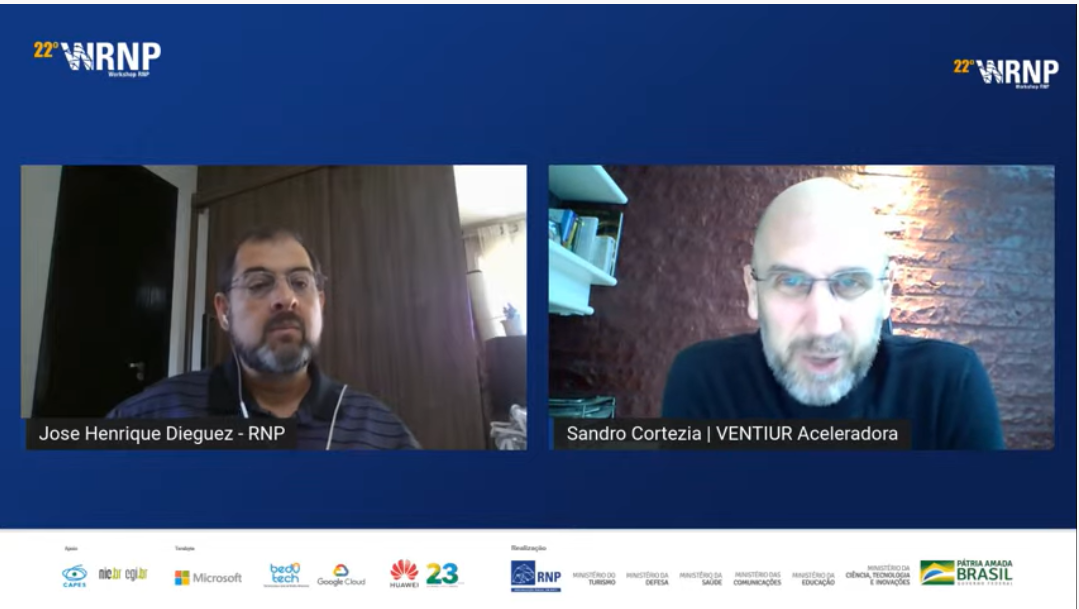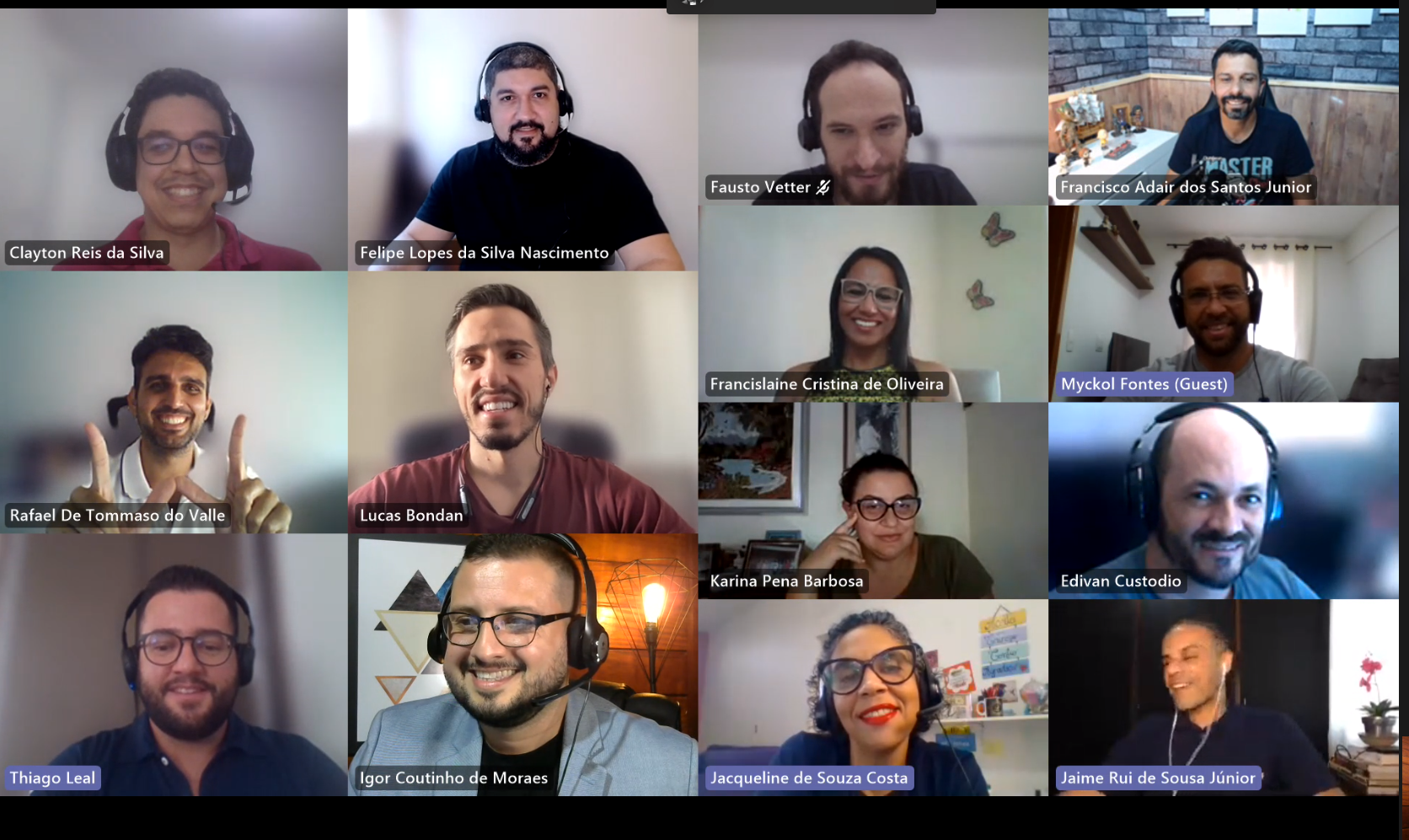WRNP 2021: Innovation, Open Science, 6G, Artificial Intelligence, and Network Programmability are the highlights of the second day
On the second day of WRNP 2021, innovation was at the heart of the discussion between the Advisor of Research, Development, and Innovation of RNP, José Henrique Dieguez, and the keynote speaker for the event Sandro Cortezia, founder and CEO for startup accelerator Ventiur. During the conversation, Sandro contextualized the role of the accelerator, the first in the South region of Brazil, created at the end of 2012, and presented an overview of the history of the innovation ecosystem in the country, highlighting the key role of the entrepreneurs in the innovation process.
"Is unanimous that, when looking for projects to invest in, investors look at who is the entrepreneur or the team of entrepreneurs, what is their profile, of those heading the business. At the end of the day, it is the entrepreneur that makes things happen," said Cortezia.
During the conversation, the duo also shed light on the challenges faced by scientific researchers in Brazil so that they can, in fact, generate innovation for the market and how the Legal Framework of Startups can contribute in this sense.
"An important aspect of the framework is that regulatory agencies may direct R&D resources to startups. This will open a very interesting space where research projects can become startups. I think this is one of the more interesting aspects that we are looking into. I, in particular, would love to invest in scientific startups, which have a more robust technological differential, but it is difficult, especially in Brazil. We still have a long way to go when it comes to research work that generates innovation, and that actually goes to market," pondered Sandro Cortezia.
During the same panel, RNP and Anprotec announced the results of the pilot project with technology parks, which are now part of the RNP System, with access to high-performance connections and advanced services. They are ZENIT park of UFRGS, CITTA Park of UFCG; Science and Technology Park of Guamá; Technological Park of UFRJ (RJ); Technological Park of São José dos Campos (SP); and BIOTIC Park (Brasilia-DF).
Women in IT
The WRNP 2021 also had Lindália Reis, CEO of the Hacking.Rio event, as a keynote speaker. In a panel moderated by the director of Research and Development at RNP, Iara Machado, Lindália combined her personal experiences and data that paint a clear picture of gender inequality in environments that are predominantly male to structure a narrative about women's place in IT. As shown by the figures presented by Lindália, in the administrative councils of Brazil, for example, only 2.5% to 3% have participation of women. "If we do not actively intervene, we will not be able to change this cycle, and it will take about 80 years to achieve equity," she argues.
This scenario filled with obstacles to women was also aggravated by the pandemic. According to data from a survey carried out by the company Girl in Tech, of 2021, particularly during this period, with their children at home, mothers feel more burdened and exhausted, even when compared to men with children. 78% of them reported that it is very difficult to reconcile work with domestic tasks, and 79% declared they felt exhausted.
"I remember that in the engineering program, there were classes in which I was the only woman. Then, as an executive or advisor, I was the only woman. In the investment industry, there were very few women when I began to be an angel investor. So, it is up to us to also help and inspire other women not to be afraid to take on these roles," she says.
Open Science
How academic networks can support Open Science was the topic of the panel with the executive director of the Latin American Cooperation of Advanced Networks (RedCLARA), Luis Eliécer Cadenas, and the manager of Engagement of Géant, Sarah Jones. The panelists talked about the challenges and opportunities to help researchers to collaborate more between themselves.
First of all, what is Open Science? According to Sarah Jones, "is the science that is carried out and communicated in a way that allows others to contribute, collaborate, and to add all types of data, results, and protocols to the research efforts, available in different stages of the research process".
For Cadenas, "We are very focused on providing connectivity. We need to be engaged with the universities and people who make up the education and research community," he said. Sarah Jones added. "People are the ones who will support the development of these structures to make science better".
Next, RNP presented initiatives to amplify the support for e-Science in Brazil, with examples in the area of high-performance computing and management of virtual collaborations, in a panel moderated by the R&D Manager of RNP, Gustavo Dias, and with the participation of researcher Univali Michelle Wangham and RNP analyst Jeferson Souza.
Artificial Intelligence
At the opening of the event, Oscar Mauricio Caicedo Rendon, researcher of the University of Cauca, Colombia, was the guest speaker invited to stage B to address the main advances in Artificial Intelligence in the context of computer networks. During the session, moderated by the RNP's associate director of RD&I Lisandro Granville, the researcher said: "The first step is to use simulated and controlled environments to assess the behavior of solutions in real networks, with real traffic and topologies. It needs to move on to practice, to prototypes."
RNP in the times of the pandemic
The director of Services and Solutions at RNP, Antônio Carlos F. Nunes, presented the main initiatives by the organization in the face of the pandemic. He spoke about the challenge faced by RNP with the need to scale, in an emergency context, its services, and offerings to meet the demands of education and research institutions and argued that the need for work and study from home, due to social isolation, has created new network use patterns, with new perimeters and extended security.
"The pandemic has brought an urgent need for RNP to reinvent itself for direct action on the challenges posed to our institutions. We experienced a genuine process of digital transformation so that we could quickly act and provide institutions with services, solutions, products, and training, in a creative and innovative way, swiftly and at scale, with quality, safety, and privacy, meeting the demands and urgencies that have emerged since 2020, so that these institutions could continue working, even though remotely, continuing with efforts of training, research, teaching and education for a wide range of students throughout Brazil," explained Nunes.
He also highlighted phenomena and initiatives such as the exponential increase in the use of the Web Conference service; the provision of services through NasNuvens; the deployment of digital identity and certification services, such as the ICPEdu and Digital Diploma; meeting the needs related to information security, particularly GDPR; the need to democratize access to the Internet through the Connected Students Project; the connection of Family Healthcare Units; and remote education through the courses provided by School of Higher Education in Networks (ESR). The director of services and solutions of RNP shared the microphones with the associate directors, who detailed the main deliveries of their areas - Luiz Coelho, Services; Cláudio Silva, Solutions; Marcello de Jesus, Specialized Digital Services Unit; and Leandro Guimarães, ESR.
Kloud, the Kubernetes service of RNP
During the WRNP, RNP took the opportunity to launch its new Kloud service, a product that provides a complete ecosystem for the implementation and management of workloads in containers inside Kubernetes clusters. The benefits of the service were presented by RNP's IT analyst Roberto Lauretti and moderated by RNP's RD&I manager Mark Schwarz.
A new generation of mobile networks and 6G
Luciano Mendes, a researcher at Intel, was the WRNP speaker invited to present the 6G Brazil project, which involves 10 research institutions from throughout the country. The objective of this project is to assess the national demands for a future network and propose technological solutions to ensure that priority use cases can be met. For the researcher, the 6G network will be much more than communication. "The 6G will arrive to meet the most innovative visions. One of them is to break this paradigm and create new features so that the network can deliver services and experiences that go beyond the transmission of data".
Network Programmability
The concrete feasibility of Network Programmability, thanks to advances in new technologies like SDN and NFV, was the topic chosen for the WRNP 2021 panel in partnership with the Brazilian Symposium on Computer Networks and Distributed Systems (SBRC), organized by the Brazilian Computing Society (SBC).
Moderated by the assistant director of RD&I at RNP Lisandro Granville, the panel had the participation of Mark F. Schwarz (RNP), Christian Esteve Rothenberg (Unicamp), and Frédéric Loui, technical leader of the academic networks of France (RENATER) and Europe (Géant).
During the panel, Frédéric Loui presented the results of project RARE (Router for Academia Research Education), funded by the European Commission, for the deployment of controller software for data routing. Read more about project RARE
This year, the Workshop RNP (WRNP) is sponsored by Microsoft, Bedutech and Google Cloud, Huawei, dataRain and AWS, Grupo Binário, Microhard and Padtec, and supported by Capes and the Managing Committee of Internet in Brazil (CGI.br). The WRNP traditionally occurs simultaneously with the Brazilian Symposium on Computer Networks and Distributed Systems (SBRC), organized by the Brazilian Computer Society (SBC).
For more information, visit: wrnp.rnp.br

